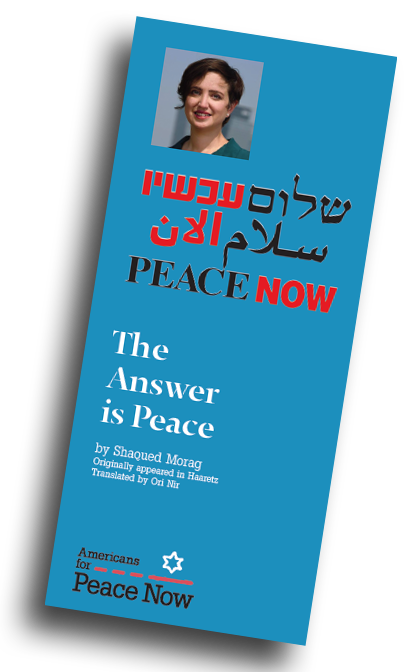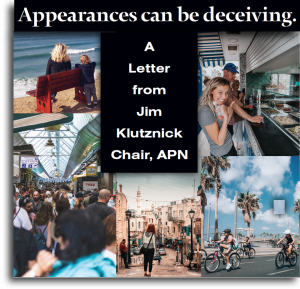Debra Shushan, APN Policy and Government Releations Director, appeared on CGTN on Thursday, September 19 to provide analysis on the results of the Israeli election.
Debra Shushan, APN Policy and Government Releations Director, appeared on CGTN on Thursday, September 19 to provide analysis on the results of the Israeli election.
Yossi Alpher is an independent security analyst. He is the former director of the Jaffee Center for Strategic Studies at Tel Aviv University, a former senior official with the Mossad, and a former IDF intelligence officer. Views and positions expressed here are those of the writer, and do not necessarily represent APN's views and policy positions.

This piece by Shaqued Morag, Executive Director of Peace Now, first appeared as a Ha'aretz article and APN has turned into a brochure.
I grew up in an era when peace was not a fantasy but an option. When I was nine, the first Oslo agreement was signed with the Palestinians. That year, the song that won Israel’s Festigal, the children’s song festival, was titled “Peace is a Useful Word.” A year later, Yitzhak Rabin signed the peace agreement with Jordan. It was clear that this was what prime ministers were supposed to do. When I was 11, the Oslo II agreement was signed. Shortly thereafter, Rabin was assassinated. At my school in Kfar Malal, they continued to educate for peace. We came every year to Rabin Square for the memorial, welcomed the withdrawal from Lebanon and later from the Gaza Strip, and continued to believe in peace. Because there is no other way.
But what was known to every child in the 1990s, that occupation is temporary, and that peace should be sought, has become much less clear over the years. While “Candlelight Youth” of 1994 grew up to be a high-tech generation, the settlers’ Hilltop Youth settled in Israeli positions of power to make the temporary as permanent as possible. Illegal outposts began to pop up deep in the West Bank, in areas that were not supposed to be part of Israel after the peace agreement. Today, their number exceeds 100. What is being sold to us as a “political deadlock” is actually a very dynamic situation, where facts are set on the ground by a minority that does not wait for Israeli citizens’ approval.
 Appearances can be deceiving. The cafes of Tel Aviv
bustle and are full. Families gather in the gardens of Haifa and float on the Dead Sea. Even in
Jerusalem all appears calm, and the slight whiff of imminent apprehension is barely detectable. The
conflict does not impinge upon the good life.
Appearances can be deceiving. The cafes of Tel Aviv
bustle and are full. Families gather in the gardens of Haifa and float on the Dead Sea. Even in
Jerusalem all appears calm, and the slight whiff of imminent apprehension is barely detectable. The
conflict does not impinge upon the good life.
And yet, tensions simmer. Another Israel exists. Check the budget and see how a constant state of alert devastates funding for Israeli education, for social services, and for investment in infrastructure. Stroll the cemeteries, and see dates of death following dates of birth in quick succession. Too quick. Examine the passerby and count the war injuries, visible in the wheelchairs and the prostheses. Read the public opinion polls giving voice to the low esteem in which the “Occupier,” is held. Visit the mosques in Nablus or in Gaza and hear the hatred dripping venomously from the imams’ tongues. And then ask yourself, soberly, is doing nothing but accepting the status quo the best possible program?
Produced by the Foundation for Middle East Peace in cooperation with Americans for Peace Now, where the Legislative Round-Up was conceived